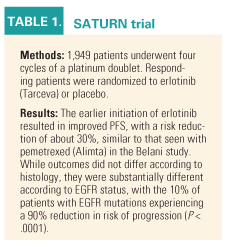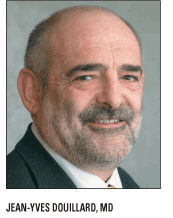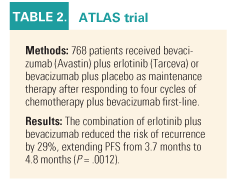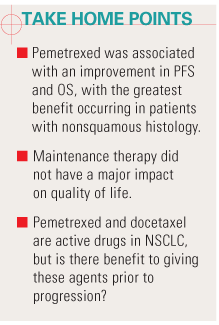Maintenance chemotherapy for NSCLC: Concept advances, consensus lacking
ORLANDO-Results of a pivotal trial presented at ASCO 2009 boosted the concept of maintenance chemotherapy for advanced non-small-cell lung cancer, but not everyone is ready to wholeheartedly embrace the idea.
ABSTRACT: Lung cancer experts raise important questions about timing, toxicity, targeted agents, and quality of life.
ORLANDO-Results of a pivotal trial presented at ASCO 2009 boosted the concept of maintenance chemotherapy for advanced non-small-cell lung cancer, but not everyone is ready to wholeheartedly embrace the idea.

“Two years ago, who would have thought this would be a topic for discussion? Now it’s become a contentious area,” said Lawrence Einhorn, MD, Lance Armstrong Foundation Professor of Oncology at Indiana University in Indianapolis.
The phase III trial by Chandra P. Belani, MD, and colleagues randomized (on a 2:1 basis) 663 patients who advanced after four cycles of platinum-based chemotherapy to pemetrexed (500 mg/m2 every three weeks) or placebo until disease progression.

Pemetrexed (Alimta) was associated with a two-month improvement in progression-free survival (PFS) and a 2.8-month improvement in overall survival (OS). The greatest benefit occurred in patients with nonsquamous histology, according to the investigators (abstract CRA8000).
Dr. Belani, deputy director of the Pennsylvania State Cancer Institute in Hershey, predicted the findings could lead to a new treatment paradigm. The FDA was certainly convinced, recently approving pemetrexed as the first drug for the maintenance treatment of advanced NSCLC.
But others are cautioning that maintenance therapy should not be universally endorsed as the standard of care. “At present, studies evaluating maintenance chemotherapy in metastatic NSCLC have reported conflicting results,” said Jean-Yves Douillard, MD, professor of medical oncology at the University of Nantes in France.
At ASCO 2009, lung cancer experts put the current results in perspective and raised important questions about timing, toxicity, targeted agents, and quality of life.

How conclusive are the trials?
Joan Schiller, MD, chief of the division of hematology and oncology at the University of Texas Southwestern Medical School in Dallas, said she prefers the term “extended-duration” chemotherapy because “maintenance” implies continuation of the original drug. She noted that a number of randomized trials have evaluated the issue, most of which came up with negative results. But that losing streak has been broken by more recent studies.
A trial by Panos M. Fidias, MD, and colleagues had a design similar to the trial by Dr. Belani’s group, but patients were treated with four cycles of gemcitabine (Gemzar)/carboplatin, then randomized to immediate docetaxel (Taxotere) or delayed docetaxel (given upon progression).
Median PFS was 5.7 months with immediate docetaxel vs 2.7 months with delayed treatment, and 12-month PFS was 20% vs 9%, which was highly significant (P = .0001). The OS, which just fell short of significance, was 12.3 months with immediate docetaxel and 9.7 months with delayed treatment (J Clin Oncol 27:591-598, 2009).

A recent meta-analysis of 13 studies involving more than 3,000 patients found a hazard ratio for PFS of 0.75 with extended-duration chemotherapy (P < .001), and for OS, 0.92 (P = .03) “But the survival benefit was modest at best, and the meta-analysis only became positive with the addition of the preliminary results of the maintenance pemetrexed study,” Dr. Schiller said. “Not unexpectedly, adverse event rates were higher with extended-duration therapy.”
The study also found greater benefits when patients received a drug other than their original chemotherapy, especially a third-generation rather than an older agent, suggesting that active, non-cross-resistant regimens are important in this setting, she said (J Clin Oncol 27:3277-3283, 2009).
Is it the drug or the timing?

There is no question that pemetrexed and docetaxel are active drugs in NSCLC, Dr. Einhorn emphasized. Nasser Hanna, MD, of Indiana University, and colleagues showed docetaxel and pemetrexed to be equivalent as second-line therapy (J Clin Oncol 2004;22:1589-1597). “The question is whether there is benefit to giving these agents prior to progression,” Dr. Einhorn said.
With the impressive P values in the Belani study (P < .00001), he noted, “no one would question the significant prolongation of PFS by giving immediate pemetrexed. And it improved survival, but perhaps this was not due to the maintenance strategy.”
Overall, in the Belani trial, 67% of placebo patients received some form of additional treatment after study discontinuation, but only 19% got pemetrexed. Similarly, in the Fidias study, 38% of the patients on the delayed arm never received docetaxel, while those who did receive the drug upon progression achieved the same survival as those who received it immediately.
“The Belani study was not a study of immediate pemetrexed vs delayed pemetrexed, since 81% of the placebo patients never got pemetrexed. This is a fallacy in design. In my practice, I don’t have 81% of patients who progress and don’t get pemetrexed,” Dr. Einhorn said. “I would question whether the positive results are because a significant percentage of the control population never got the active drug.”
Targeted agents
Again, the benefits derived from using the newest agents are not yet clear with regard to maintenance treatment, although Dr. Schiller predicted that will change. “In the age of targeted therapies, we are going to see more studies raising the question of which, if any, should be the maintenance therapy drug,” she said.
Pemetrexed may not be the only player in the maintenance game based on findings from two other ASCO studies, SATURN, involving erlotinib (Tarceva) (abstract 8001), and ATLAS, involving erlotinib-bevacizumab (Avastin) in the experimental arm vs bevacizumab in the control arm (abstract LBA8002). Both studies evaluated PFS, but OS data were not mature, Dr. Schiller said (see Tables 1 and 2 on page 5).
In SATURN, since only 16% of patients on the control arm ever received a tyrosine kinase inhibitor (erlotinib or gefitinib [Iressa]), a survival difference may not emerge in that study, Dr. Hanna predicted (see Vantage Point on page 7).

“SATURN reinforces that erlotinib is active and effective irrespective of histology (and disproportionately in EGFR mutations),” Dr. Hanna said. “But could we preserve the survival benefits if we delayed its use and allowed a treatment break?” he asked.
Quality of life
Regardless of the agent used or the timing of the treatment, maintenance therapy did not have a major impact on quality of life in the studies discussed. Pemetrexed was associated with more grade 3-4 toxicity albeit at low rates.
“In my view, grade 1 and 2 nonhematologic toxicities are not trivial to our patients,” Dr. Hanna said. “And it is clear that PFS is improved when bevacizumab and erlotinib are combined vs either agent alone, but toxicity is increased, including potentially life-threatening arterial thrombotic events.” He added that there is no indication that survival or quality of life is enhanced.
Other considerations are the time, effort, and inconvenience required of patients and caregivers long-term, Dr. Einhorn pointed out. “Would you want a long duration of chemotherapy?” he asked.
While the PFS boost in the tested strategies was modest at best, Dr. Douillard predicted that clinical practice may just forge ahead with maintenance therapy. He called for better selection of patients based on histology and biomarkers.
Dr. Hanna favors treatment breaks in patients who achieve a durable response or have indolent disease. Frequent follow up is critical in order to identify and treat progressive disease at its earliest, and the monitoring interval should be based on clinical presentation, pace of disease, and symptoms. “Initially, follow up should be done early, since most patients progress early,” he said.
In the final analysis, survival trumps all, according to Dr. Schiller. “What is important to patients is not when they progress, but when they die,” she said.
